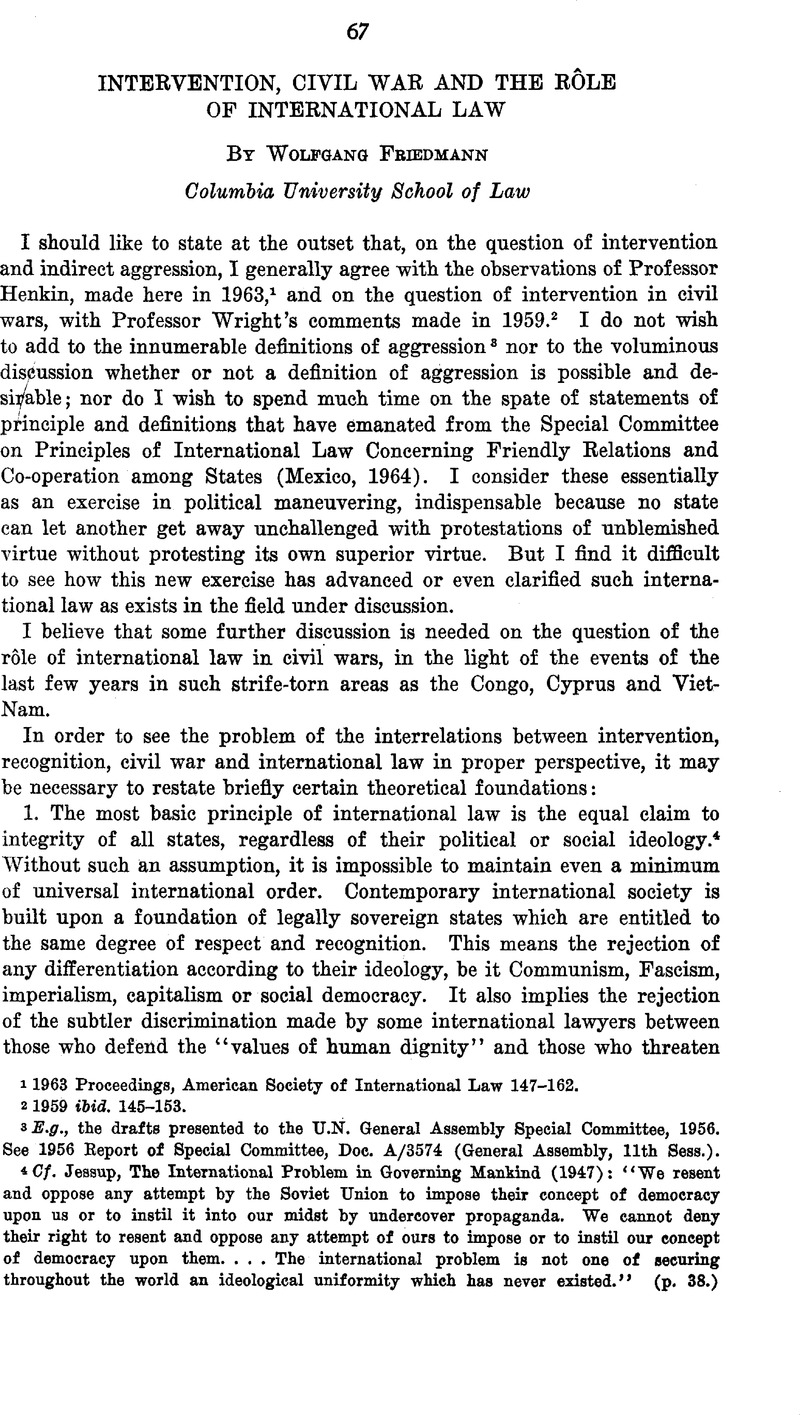Published online by Cambridge University Press: 27 February 2017

1 1963 Proceedings, American Society of International Law 147-162.
2 1959 ibid. 145-153.
3 E.g., the drafts presented to the TJ.N. General Assembly Special Committee, 1956. See 1956 Eeport of Special Committee, Doc. A/3574 (General Assembly, 11th Sess.).
4 Cf. Jessup, The International Problem in Governing Mankind (1947): “We resent and oppose any attempt by the Soviet Union to impose their concept of democracy upon us or to instil it into our midst by undercover propaganda. We cannot deny their right to resent and oppose any attempt of ours to impose or to instil our concept of democracy upon them… . The international problem is not one of securing throughout the world an ideological uniformity which has never existed.” (p. 38.)
5 McDougal and Sehlei, Studies in “World Public Order 817 (1960).
6 Thus, Dean Acheson in 1963 Proceedings, op. cit. 13.
7 A/5746, Nov. 16, 1964, 19th Session.
8 See, e.g., McDougal and Feliciano, Law and Minimum World Public Order 40 (1961).
9 For the most recent authoritative exposition of this view, see the speech made by Secretary of State Dean Eusk at the Annual Dinner of this Society on April 23, 1965, below, p. 247.
10 R. A. Falk, in International Aspects of Civil Strife at 194 (Bosenau ed., 1964), distinguishes between “rebellion” (purely domestic internal war), “insurgency” (partially internationalized conflict) and “belligerency” (fully internationalized conflict).
11 2 International Law 60 (6th ed., Lauterpacht, 1952).
12 A Treatise on International Law 347 (8th ed., 1924).
13 See in particular his article, “United States Intervention in the Lebanon,” 53 A.J.I.L. 112, 121 et seq. (1959).
14 Brownlie, International Law and the Use of Force by States 327 (1963).
15 R. A. Falk (in International Aspects of Civil Strife 185, 207 ff. (Rosenau ed.7] 1964)) sees the main causes of such intervention in the revolutionary ideology of China and the Soviet bloc and the anti-colonial commitments of the Afro-Asian nations. He deduces from this a counter-balancing right of counter-intervention (rule of mutuality). Kaplan (ibid. 92 ff.) sees civil war intervention, more impartially, as a result of the “loose bipolar period” (choosing as examples Soviet intervention in Hungary and U. S. intervention in Lebanon).
16 Cf. R. A. Falk, “Contemporary Theories of International Law,” 50 Virginia Law Eeview 234, with reference to the position taken by most American commentators on the Cuban quarantine: “The authors instead appear to mobilize legal arguments in support of a national position in a period of crisis. This is an appropriate perspective for an American official or perhaps a citizen, but it is inappropriate for international lawyers concerned with appraising legality from a global perspective in such a way that the nation of a scholar's origin is a factor of diminishing importance. The onesided nature of the various analyses was particularly striking for authors who used the rhetoric of a world community perspective but limited themselves to the arguments favorable to the United States’ (regional) interpretation of law.”